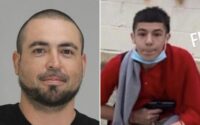David Weiss’ credibility ‘non-existent’ to lead Hunter Biden case, IRS whistleblower says
WASHINGTON — IRS whistleblower Gary Shapley said Tuesday that special counsel David Weiss’ credibility is “non-existent” after reporting over the weekend indicated that Weiss nearly let first son Hunter Biden off without any charges before insisting on a probation-only plea deal after Shapley stepped forward.
“His credibility is just non-existent at this point. He played his cards in this investigation,” Shapley told Fox News host Martha MacCallum.
Weiss, the longtime Delaware US attorney, was elevated by Attorney General Merrick Garland to be special counsel on Aug. 11, expanding his investigative and charging powers after the 53-year-old first son’s plea deal to tax and gun charges fell apart under scrutiny by a federal judge.
The New York Times reported Saturday that Weiss said earlier this year that he did not want to bring any charges against President Biden’s son, before pivoting to what critics called a “sweetheart” deal after Shapley in April publicly alleged a cover-up in the case.
“[Weiss] decided what was going to be charged. He was, at one point, based on the information released this weekend, was at one point not even going to charge him — and he was part of the investigation that allowed the investigative steps not to occur,” Shapley said.
“The release this weekend was really shocking,” he added.

For more than three years, Shapley led a 13-person team that investigated Hunter Biden’s foreign income from countries such as China and Ukraine during and immediately after his father’s vice presidency.
A subordinate, IRS special agent Joseph Ziegler, opened the case in 2018, worked on it for five years, and corroborated many of Shapley’s claims during congressional testimony last month.
The entire IRS team was removed from the Hunter Biden case on May 15 in alleged retribution for the whistleblowing by Shapley and Ziegler — after collecting evidence that Hunter failed to pay at least $2.2 million in tax on $8.3 million in largely foreign-sourced income earned between 2014 and 2019.
“I would be full onboard to assist moving forward, whether it was with Mr. Weiss or with a different special counsel, and I don’t know really how it moves forward without it,” Shapley told McCallum.
Congressional Republicans denounced Weiss’ appointment as part of a continuing cover-up and noted his conduct was a central focus of the whistleblowers.
Critics point to reports that Weiss worked with Hunter’s late brother Beau and that his office is full of prosecutors with links to the Bidens — and note that Justice Department special counsel regulations call for the appointees to be selected from outside the department to ensure their independence.
Skeptics also note surprising personal baggage associated with Weiss, whose father was a corrupt IRS agent imprisoned for taking bribes.
The new special counsel is a central figure in claims presented to Congress by Shapley and Ziegler.
Shapley said that Weiss contradicted Garland’s under-oath testimony that Weiss had “full authority … to bring cases in other jurisdictions if he feels it’s necessary.”

At an Oct. 7, 2022, meeting, Weiss allegedly told Shapley and six other FBI and IRS officials that he actually didn’t have that authority.
Weiss and Garland have publicly denied Shapley’s account, though an email from another IRS official, Special Agent in Charge Darrell Waldon, affirmed the accuracy of Shapley’s emailed notes from the meeting. The House Judiciary Committee on Monday issued subpoenas to four alleged witnesses in the hope of setting the record straight.
Shapley and Ziegler said that Weiss’ office indicated that it sought to bring federal charges against Hunter Biden in Los Angeles and Washington, DC, but was blocked by President Biden’s appointed US attorneys — appearing to confirm that Weiss lacked the power that Garland told Congress he had.
The whistleblowers said prosecutors in Weiss’ office also prevented them from investigating President Biden’s alleged role in his son’s foreign ventures, despite communications that directly implicated the president — such as a threatening July 30, 2017, WhatsApp message that Shapley gave to Congress in which Hunter Biden wrote to a Chinese government-linked business associate that he was “sitting here with my father” and warned of consequences if a deal was aborted.
Within 10 days of that text message, $5.1 million flowed from CEFC China Energy to Biden-linked bank accounts. As part of the same venture, Joe Biden, described as the “big guy,” was penciled in for a 10% cut from the deal with CEFC, according to a May 2017 email retrieved from Hunter’s laptop.
Shapley, backed up by testimony from a recently retired FBI agent who worked on the case, accused Weiss’ office of giving Hunter Biden’s legal team advance knowledge of a planned interview attempt in late 2020, scuttling the plan after the office also allegedly gave a heads up to Hunter’s lawyers about plans to search a northern Virginia storage unit.
The tax agents said that Weiss’ office didn’t give them full access to files from Hunter’s abandoned laptop, blocked them from interviewing other Biden family members and vetoed an attempt to get a search warrant for a guest house on Joe Biden’s Wilmington, Del. property.

Shapley said that the prosecutors in Delaware also failed to inform the IRS team that a paid FBI informant provided a tipoff that Mykola Zlochevsky, the owner of natural gas company Burisma Holdings, which paid Hunter up to $1 million per year beginning in 2014, said in 2016 that he was “coerced” into paying $10 million in bribes to Joe and Hunter Biden in exchange for the then-vice president’s help getting a prosecutor fired.
Weiss became a special counsel as House Republicans discuss launching an impeachment inquiry into President Biden’s role in his son’s business ventures.
The Delaware prosecutor’s office said this month that Hunter Biden is likely to stand trial after walking away from a plea deal for two misdemeanor tax charges and a gun possession felony that would have been expunged after two years of probation.
The deal collapsed when Leo Wise, a prosecutor, said that Hunter could still face other charges for past conduct, such as alleged violations of the Foreign Agents Registration Act. Hunter’s lawyers insisted he had broad immunity and a later-released diversion agreement appeared to support that claim.
Hunter’s former business partner Devon Archer told the House Oversight Committee on July 31 that Joe Biden dined at least twice — in 2014 and 2015 — with his son’s Ukrainian, Russian and Kazakhstani associates, had coffee in 2013 with his son’s Chinese partner in a state-backed investment fund and was put on speakerphone by Hunter during about 20 business meetings.


